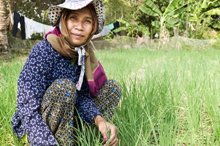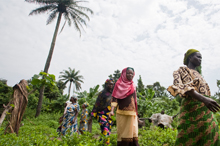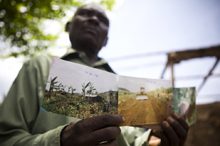How to ensure transparency in land deals
Without clear and verifiable land transactions, foreign and local investment is stymied and deals are vulnerable to corruption. Here's what the aid community can do to help promote transparency in such deals.
Land Matters was a month-long global conversation on Devex during September 2013. While this particular campaign to raise awareness about land rights for global development has since come to a conclusion, the importance of land remains a key issue for all development practitioners working toward a more sustainable future.
Devex will continue to update this website periodically, but in order to ensure you stay in the know about everything that is impacting global development, sign-up for Newswire to receive a comprehensive daily look at breaking news, analysis and opinion directly to your inbox.
Every second, poor countries lose an area of land the size of a soccer field to banks and private investors. As land values increase, and as governments worry about food shortages and famines, more large-scale land speculation and acquisitions are taking place, especially in sub-Saharan Africa. To avoid corruption and land grabs that benefit a relative few while ignoring smallholder farmers and other rural land users, acquisitions must be based on transparent, participatory planning.

Without clear and verifiable land transactions, foreign and local investment is stymied and deals are vulnerable to corruption. Here's what the aid community can do to help promote transparency in such deals.

Eight years ago, thousands of poor villagers were displaced by the construction of a massive dam in Laos, but now they have doubled their income and own their land. We asked an ADB representative how this project can be a model for others.

Studies suggest a causal relationship between land ownership and economic well-being. But it is not a straight line, writes the Thomson Reuters Foundation's Stella Dawson.

Women own, operate and manage fewer, smaller and less valuable plots of land than men, Yale University's Cheryl Doss tells Devex in an exclusive interview.

The reasons why land information matters to transparency are clear and evident, writes Nick Collier, global head of government and regulatory affairs at Thomson Reuters. Here's why.

With increasing displacement on land due to industrial agriculture and biofuel schemes and the coming resource boom in many developing countries, now is a critical time to re-examine and strengthen policies and programs that emphasize transparency through local control, writes Tiernan Mennen of Chemonics in this exclusive guest opinion.

In Cambodia, smallholder farmers and rural populations have long lacked the information they need to lift themselves out of poverty. A new open data platform is designed to help, Nicolas Mansfield of the East-West Management Institute writes.

Land matters for sustainable economies, livelihoods, human rights, and the environment- the development community cannot afford for land to be a trend. Expert panelists from DAI, Chemonics International, USAID, and Omidyar Network sat down with Devex to discuss what land rights mean for the future of global development.
Join the conversation